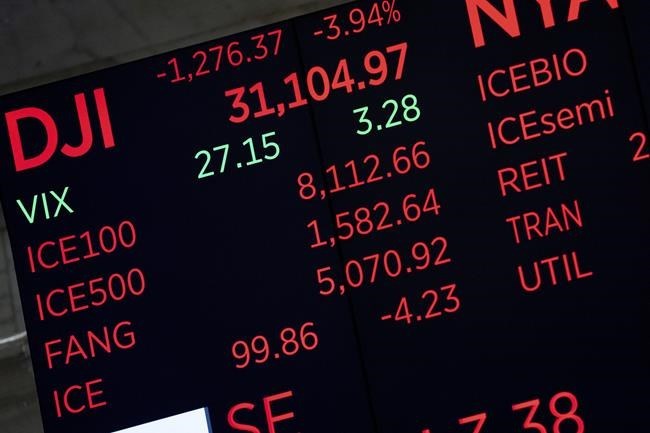TORONTO — Canada's main stock index rose Friday, led by gains in the energy, technology and health-care sectors, while U.S. markets also posted gains.
The S&P/TSX composite index closed up 133.90 points at 20,519.37.
Economic data was the main driver of market gains Friday, said Macan Nia, co-chief investment strategist at Manulife Investment Management.
Two of the Federal Reserve’s preferred measures of inflation came out Friday, showing continued signs of economic declaration, said Nia.
“Markets are taking that as a positive sign that the U.S. Federal Reserve is much closer to the pause today than what they were a quarter ago,” he said.
In New York, the Dow Jones industrial average was up 176.57 points at 35,459.29. The S&P 500 index was up 44.82 points at 4,582.23, while the Nasdaq composite was up 266.55 points at 14,316.66.
Over the past couple of weeks, more and more evidence has piled up suggesting a resilient economy even as inflation recedes under the weight of higher interest rates, said Nia.
Interest-rate-sensitive stocks in particular reacted positively Friday, with the Nasdaq up 1.9 per cent.
It’s a similar story in Canada, with the latest GDP data Friday showing moderate growth in May but a likely contraction in June.
“The signs in Canada are showing that the interest rate increases that we've seen, really the majority of them since the summer of last year, are starting to be absorbed by the broader Canadian economy,” said Nia.
Right now, markets in both Canada and the U.S. are not expecting central banks in either country to hike interest rates again in 2023, he said.
But central banks don’t want to declare victory on inflation too early, Nia said, and will be cautious going forward.
“Central banks have been put in a very uncomfortable position,” he said. “There’s factors that are contributing to inflation that are outside really the control of their policy tools.”
Amid the backdrop of hopeful economic data, earnings season is in full swing, with companies reporting a “mixed bag” of results, said Nia.
“There are companies that can navigate this environment better than others,” he said.
Among the companies reporting profits above consensus estimates were Intel and Mondelez International, while Exxon Mobile reported weaker profits than expected.
In commodities, oil slipped past US$80 a barrel as it continued its steady climb of the past month.
“Going forward, the primary driver of oil prices in the near term is going to be how the health of the global economy unfolds,” said Nia.
“We believe that as we continue to absorb these interest rate increases that we've experienced over the last year that the global economy will continue to slow. So there will be kind of a ceiling on oil prices as we move into next year.”
The September crude oil contract was up 49 cents at US$80.58 per barrel and the September natural gas contract was up four cents at US$2.64 per mmBTU.
The Canadian dollar traded for 75.57 cents US compared with 75.75 cents US on Thursday.
The December gold contract was up US$14.70 at US$1,999.90 an ounce and the September copper contract was up five cents at US$3.93 a pound.
This report by The Canadian Press was first published July 28, 2023.
Companies in this story: (TSX:GSPTSE, TSX:CADUSD=X)
The Canadian Press



